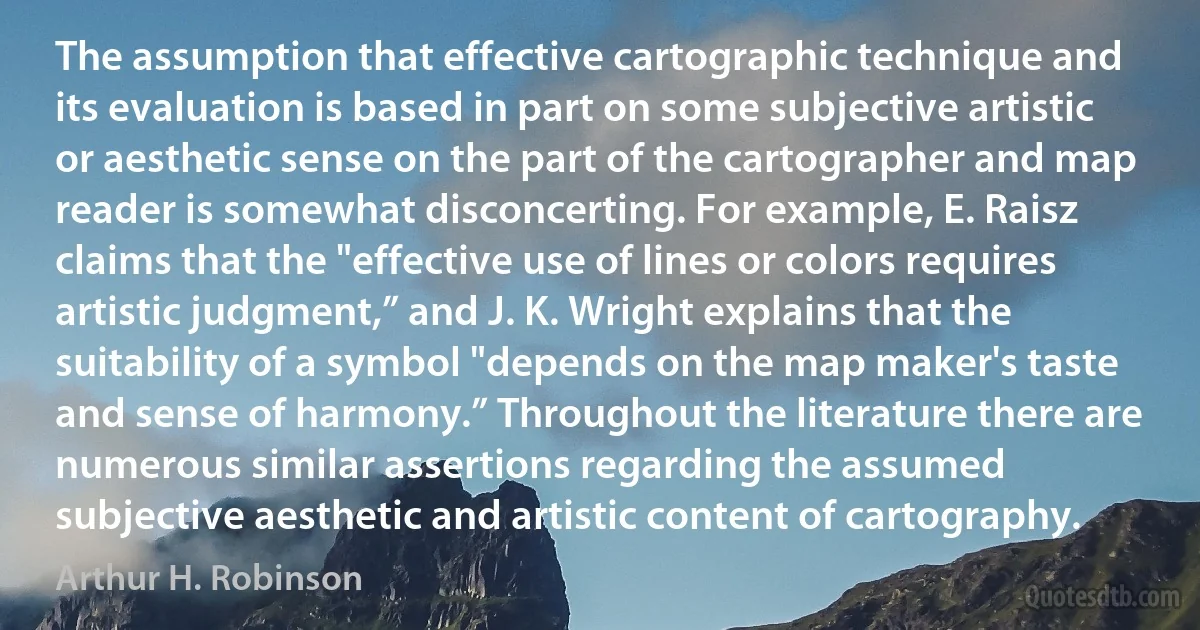
The assumption that effective cartographic technique and its evaluation is based in part on some subjective artistic or aesthetic sense on the part of the cartographer and map reader is somewhat disconcerting. For example, E. Raisz claims that the "effective use of lines or colors requires artistic judgment,” and J. K. Wright explains that the suitability of a symbol "depends on the map maker's taste and sense of harmony.” Throughout the literature there are numerous similar assertions regarding the assumed subjective aesthetic and artistic content of cartography.
Arthur H. RobinsonRelated topics
aesthetic assumption cartography content evaluation example harmony judgment sense somewhat taste technique use wrightRelated quotes
.. I want a lovely life; in order for it to be, harmony and style are necessary. I avow mine to the key of aesthetic sentiment – the constant permanent creation everywhere and in every one. All is false there, all is true. The truth is the desire to see falsely. I do not want the naked truth; it is the principle of my life. It is that which makes my life one which is artistic and complete. Feelings, events, people and things, such as they are, are nothing to me. I wish them invented, illusory, false in so far as true life and in so far as art.

Marianne von Werefkin
The struggle for existence in a universe we did not choose, and the burden of being a member of the only race which values objective, verifiable truth as an end in itself, makes us sometimes long for escape from reality -- in some cases through a literature of the fantastic, of marvelous dream worlds, of free-ranging fantasy. But we must not confuse that necessary escape with what is real. Permit me to suggest to the reader that it is a waste of his time and energy to play with fantasies that lack the literary and aesthetic charm of poetry and imaginative prose fiction.

Revilo P. Oliver
Treating cartography as a formal communication system implies that we can improve map communication if we can reduce the filtering or loss of information at various points in the system where in the system should have a positive effect, and an information loss should be impossible to overcome. Most efforts to study cartographic communication have been directed to the middle stages in the system: the cartographer's transformation of selected information into the map and the initial extraction of information from the map by the user.

Alan MacEachren
True artistic experience is never passive, for the spectator is obliged to participate, as it were, in the continuous or discontinuous variations of proportions, positions, lines and planes. Moreover, he must see clearly how this play of repeated or non-repeated changes may give rise to a new harmony of relations which will constitute the unity of the work. Every part becomes organized into a whole with the other parts. All the parts contribute to the unity of the composition, none of them assuming a dominant place in the whole.

Theo van Doesburg
A point which I want very much to establish is that the choice of these 'Readymade' was never dictated by aesthetic delectation. This choice was based on a reaction of visual indifference with at the same time a total absence of good or bad taste.... in fact a complete anesthesia. One important characteristic was the short sentence which I occasionally inscribed on the 'readymade'. That sentence instead of describing the object like a title was meant to carry the mind of the spectator towards other regions more verbal.

Marcel Duchamp
